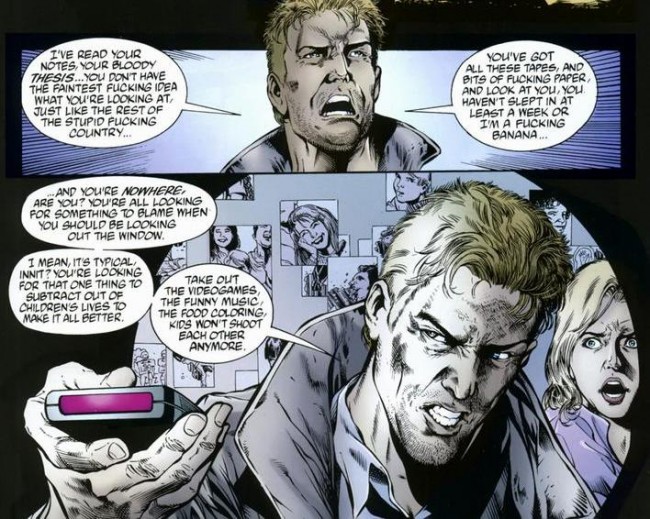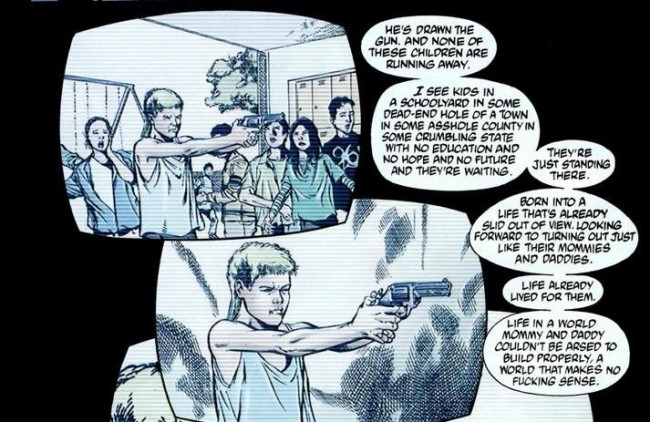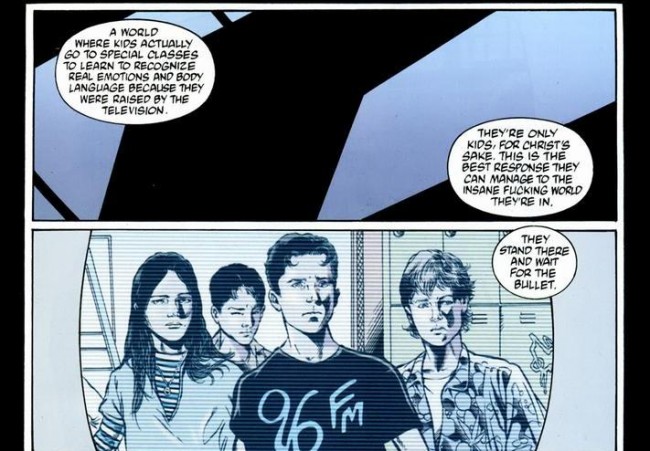
Warren Ellis’ Shoot
November 13th, 2010 by Esther Inglis-Arkell | Tags: hellblazer, john constantine, vertigo, warren ellisIn late October, Vertigo published Vertigo Resurrected, a collection of rare stories. One of them was Shoot, a story about schoolyard shootings in America by Warren Ellis. Before it was published, the Columbine shooting happened. According to Ellis, DC wanted to change the story, he refused, they refused to publish, and that was that.
The new people at DC had a different take, and obviously it’s been a while since Columbine, and so the story came out. I don’t have any problem with Ellis refusing to change his story. That’s his decision. I have to say, though, that I think not publishing it, especially at the time, was the right call. That’s a debate for another time.
For now, I’m looking at the content of the story. Reading Shoot left me feeling acutely annoyed. On his blog, Warren Ellis says that he intended the story to be horror, not social commentary. Reading the story, I’m not sure that’s true. It’s a Hellblazer story, so it has John Constantine swaggering across the page, saything pithy and clear-sighted things. In the last few pages, he gives a long speech about what prompted the shooting. I can’t say the speech wrong. What I can say, is the speech is completely off the mark.
Let’s see what we have in the paragraphs above. The first two panels are Constantine ridiculing the woman for thinking there is any one thing that made the kid do it. It wasn’t violent video games, or movies or music. Those ideas are stupid and simplistic.
So what’s his take?
Second scan, second bubble: “These are the end times.”
Second scan, fourth, fifth and sixth bubble: “The sins of the father are visited on the son.”
Third scan, first bubble: “Television is taking over.”
Third scan, second bubble: “Think of the children.”
Although the ‘raised by television’ argument is a new one, it harkens back to boarding schools, nannies, the modern novel, the internet, pacifiers, and any other invention that lets parents forget they’re parents every once in a while. The rest are biblically old. They were trotted out to explain everything from plagues to fires to pre-marital sex. They’re not useful advice. They’re not insight. They’re not even observations. They’re slogans.
And they’re slogans that can be used for anything. I’m willing to bet the people Constantine ridicules used the same lines he does. ‘Our society is crumbling’ is a set up used for any argument, from lowering taxes to distributing condoms in schools. And I know that the ‘raised by television’ bit and ‘parents asleep at the wheel’ bit were trotted out by people wanting to ban graphic video games and violent music.
To be honest, if asked to side with a person making Constantine’s speech or someone who wanted to start a campaign to tone down video game violence, I’d go with the latter. Not because I think it would work, but because it’s something. It’s some concrete step. It’s some way to engage with kids. And if it doesn’t work, it can be changed.
What Constantine is offering is a four word explanation for everything. “Society is to blame.” Well, okay. Thanks for letting us in on that.
Now what?




Well said.
It seems that offering a concrete step for change would be antithetical to the spirit of the horror story, which is about creating a world of terror from which there is no escape. If you can beat the bad guy at the end, it’s a thriller. If there’s no way out, it’s horror. Constantine’s speech isn’t “society is crumbling…and we need to fix it!” What he’s saying is, “This is the crop you planted, and it’s harvest time.” Lovecraft doesn’t offer up concrete steps to defeat Cthulu. While the horror may sting more acutely from being based directly on unfortunate aspects of our immediate reality, that doesn’t mean it has a special responsibility to offer up solutions.
You’re getting annoyed at a middle class social commentator speaking through the medium of a comic book?
In Ellis’ defence, it’s not the place of a comic book to solve anything because the reader is a consumer and if they’re angry enough it’s on them to do something instead of looking to the writer to tell them what that might be.
The lights are growing dim. I know a life of crime led me to this sorry fate. And yet, I blame society. Society made me what I am.
Good article.
You’d really side with the latter, Esther? It might be a concrete change, but it’s a surface-level one. It’s like improving the punctuation to an essay or story that has no clear idea to it. Plus, I’m not sure how taking away or censoring something from kids without them having a say in it is a way to “engage” them. Just subtracting crap out of people’s lives never works anyway, because we’ll just find substitutes. Something positive needs to fill that void.
To me it looks like Ellis is saying that kids don’t feel like their concerns about themselves and how they interact with the world are being met. Parents don’t have enough time for them, and schools just want them to click in and pass the class requirements and get out.
It’s more than just a passive “society is to blame” answer, and it’s not a nihilistic “end times” response either. It’s a cause-effect illustration of a breakdown of communication between teens and the adult world. The comic is showing that if you want a concrete solution, then it needs to be a multi-tiered method of re-establishing communication with the younger generation to address their concerns about their identity and how they fit in their current world and the one outside high school. Some of these concerns will be overblown teenage thoughts and some will be real issues that affect their confidence in their identity. If they don’t feel they fit in with “the world that’s been laid out for them” what can be done to address that? We won’t know until we talk with them.
When I talked to my students as an English TA, they felt none of their assignments “cared what they thought about” or met their interests, so we created free range essays that allowed them to write something they felt invested in. Sometimes they were short story sequels to The Dark Knight, sometimes they were about breaking in and exploring an abandoned hospital, and sometimes they were just essays discussing their fears about being the first in their family to be in college. They still had to do the main curriculum assignments, but the free range essays allowed them to recognize their writing voices and bring in more ownership in their writing. Those aspects bled noticeably into the more static essays. The only thing this change cost us was one day of class discussion and revising the class schedule a bit. Was it a panacea to those students’ problems? No, but I’d like to think it helped.
My anecdote’s point is that you don’t need massive subtractive campaigns or zero tolerance rules in schools to get kids be constructive members of society. It can and almost has to be a collection of small changes from the community. A little bit more freedom in this class, a chance to job shadow there, an opportunity to include the parent in the kid’s education here; it all adds up. It might be corny and cliched, but it doesn’t make it any less true.
@Brig: I’m getting annoyed at what the writer says, not that he’s commenting at all. Although, yes, I’m usually not a fan of social commentary through entertainment because it almost always goes completely wrong.
@Jason Michelitch: That is a good point. Then again, school shootings have been going on since the 1970s at least. And mass murders have been happening a lot earlier than that.
@Dane: Well, if it helps, I would pick your way over the banner’s way. But Constantine isn’t offering a ‘way’. He’s yelling about a crumbling society and that’s it.
The banner’s also, I think, are on the right track when it comes to trying to make this kind of thing a widespread policy rather than a local change. Don’t get me wrong, I think that local stuff is incredibly important, but ‘have an exceptional TA teach a class’ isn’t a valid plan. If you found a way to get exceptionally good teachers into schools, or revamped education, or expanded the social safety net or jumpstarted the economy – that’s a way to change. But Constantine’s speech, while supposedly being about the big pictures and truth and wisdom and such, was actually a bunch of platitudes which offered nothing.
Ellis could have called the story “Kids! What’s the matter with kids today!” and it wouldn’t have significantly changed the course of the story.
Plus, irritatingly enough, he confuses classes for people with Asperger’s as being classes that everybody should take. Yeah, and they’re all being given wheelchairs because they can’t even walk. Well, not all of them, a few of them, but why not generalize a small sampling to a larger population?
Oh! Another title: “What if Ron and Nicole killed OJ? DID I JUST BLOW YOUR MIND?”
-Darren MacLennan
I never said my anecdote was a valid or endgame plan; it was just an example of practical change we can all do to fix a problem, rather than making war on some object we deem to be destroying kids. And really, the story didn’t need to offer a “way.” Honestly if it did I’d be upset, because every community has its own hurdles to leap. That’s like expecting satire to spoon feed a wide audience an answer to deep and pervasive social issue. Last time I checked A Modest Proposal it didn’t offer a helpful three step plan to helping out the Irish, but it was no less important in developing the discourse of the issue.
You say that it’s all platitudes, I say it tries to showcase how kids often feel about their control of themselves and their destiny, which I did feel got glossed over during the shooting aftermath. More often than not all a piece of literature can do or should do is create a better picture of what the problem is. After that, it’s up to us as citizens to reverse-engineer solutions through inference, communications and critical thinking.
@Dane: I’m sorry, Dane. I didn’t mean to belittle what you did.
I can understand what you’re saying. Thanks for the comment.
Thank you for articulating what’s so upsetting, and ultimately counterproductive, about this story.
I get the feeling Ellis is really afraid to see his targets as individuals sometimes, .
In that first panel, Constantine identifies himself as a banana.
That begs the question: what’s the status on the size of his spoon?
I take issue with his point about classes that help kids figure out emotional cues and body language. Regardless of their television take, not everybody is good at that sort of thing. Some kids, like those with certain kinds of learning disabilities and some on the autism spectrum, have a great deal of trouble with that sort of thing and often really do need specialized help. Blaming the need for that on television, and dismissing that kind of education outright comes off as ignorant and ableist.
So I kinda want to tell Constantine to fuck off for dissing special education. I don’t think one solution fits all, but sometimes when kids can get more specialized and individualized education and help in schools, it can have a huge positive impact on their lives, which may have side effects like reducing their sense isolation and increasing self-esteem, which perhaps are the sorts of things that may prevent kids from wanting to shoot each other? Maybe? IDK. But I don’t like this comic. =(
I didn’t realize that Constantine was supposed to stand there and soapbox to people about social issues. What the hell? Is there really any in-story reason for him to be involved or is Ellis just using him to vent his spleen? When Ennis (or say, Mike Carey) was writing Hellblazer, these kinds of things seemed to rise organically, but this just seems like a JMS-esque jeremiad.
@Lugh: The in-story reason is that a friend of his moved to the US to get away from the high London crime rate and his kid died in a school shooting. So there’s the added stench of “Oh, England, the land of milk and honey, WHERE THIS NEVER HAPPENS”
“Shoot” was never a particularly strong story. Let’s get that out of the way right now.
That said, the interesting thing about it is that it was obsolete the moment it was written because of Columbine. Eleven years later, Constantine looks like he’s trying to scare us with the readily obvious, but that’s after eleven years of pop-psychology and angry debate.
At the time “Shoot” was written in 1998, high/middle school shootings weren’t uncommon but none had been as lethal or as organized as Columbine was. “Shoot” seems to be heavily based on the Westboro shooting in 1998, which involved an eleven-year-old setting up an ambush for members of his class. It’s pretty obvious grist for the horror mill.
If you go back and look at the thrust of the discussion immediately following Columbine, though, there was a mad rush to blame absolutely anything for it except ourselves. Every commentator with a column inch, back before the golden era of blogging, used Columbine and other shootings as a chance to chip away at their pet hatred: heavy metal, violent movies, video games, etc. It was a violent moment of cultural insanity, where a lot of people had a lot invested in pointing the finger at anything other than what the actual root causes were: a toxic environment, inattentive parents, and easy access to illegal firearms.
In that particular scenario, a horror comic stepping forward and saying, no, it’s none of that, it’s our goddamn fault… well, that seems like a fine use of what horror as a genre is good at. It’s not done well in “Shoot,” but had it been published in 1999 instead of 2010, it’d be a great deal more revelatory than it comes off as now.
It comes across as heavy handed to me…but then again I take my opinion of the whole Columbine thing from the most sane view on the situation: Chris Rock!
“We were picked on…we were outcasts…we didn’t have any friends”
“Outcasts? There were 6 of them mugs! I didn’t have 6 friends in high school! I don’t have 6 friends now!”
Warren Ellis’ view was from pedestal looking down here, belittling the audience…
Unfortunately, with these views, we’ll never have a real answer behind the motivations, but isn’t that like most shocking crimes of this sort?
Personally, I thought a lot of the kids were frozen in disbelief at what was going on. Then when they realized the grave danger, it was too late…
Just to nip this in the bud, the Columbine shooters were NOT “picked on” for the reasons most people think. Actually, most people hated them because they actively hated most people and THEY picked on other kids. Few people seem to recall that one of the shooters e-stalked a friend of his threatening to kill him on blogs, calling him up, and going to other insane lengths. One of them even had anti-depressants/anti-psychotics he was supposed to take, but he didn’t.
And this bit “Unfortunately, with these views, we’ll never have a real answer behind the motivations, but isn’t that like most shocking crimes of this sort?” is completely untrue of Columbine. There’s literally 1,000 pages of diary entries, planning videos, etc. that these kids made spilling their guts.
To cut it short, they were sociopaths (a lot of the reasons they were hated is that they’d have violent outbursts, yell at “friends,” one of them even got into a physical fight with a close friend for seemingly no reason a few months before the shooting) who through meeting each other enabled themselves to become psychopaths. If they hadn’t been friends, none of it would have likely happened.
It’s also key to note that Columbine was never meant to be a shooting, but a bombing. They, in their own words, wanted to “pull a McVeigh” and demolish the entire school, and planted the bombs where they could potentially do the most damage. Had it worked, the second floor would’ve caved in on the first one, causing a great deal more deaths. And for the survivors and rescue teams, the shooters would’ve been waiting outside to gun THEM down as well.